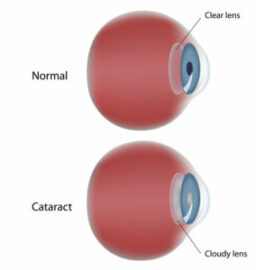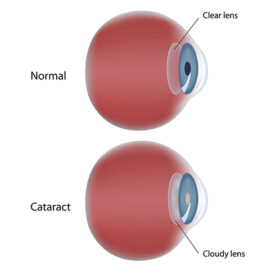Cataract Awareness!
Posted by: Eye Specialists of Mid Florida in Blog
Approximately 25 million Americans have cataracts, which cause cloudy, blurry, or dim vision and often develop with advancing age. This June, Eye Specialists of Mid-Florida join the American Academy of Ophthalmology in observing Cataract Awareness Month by sharing information everyone should know about the condition and its treatment. As everyone grows older, the natural lenses […]
Read MoreHealthy Vision Month!
Posted by: Eye Specialists of Mid Florida in Blog
Healthy Vision – By: Chelsea Hollier, O.D. Routine eye exams can help your eye doctor prevent, diagnose, and treat vision problems and eye disease in children and adults. In addition, the National Eye Institute recommends several ways to maintain healthy vision. Do: Don’t: In addition to getting routine exams, visit your eye care professional if […]
Read MoreAugust is Children’s Eye Health/Safety Month
Posted by: Eye Specialists of Mid Florida in Blog
Children require clear and comfortable vision to be successful in school and extracurricular activities. They use their eyes to read, write, throw a ball, use computers, watch TV, and everything else. As children advance in school, the demand for clear vision increases because they spend more time reading and learning. Therefore, any vision problems for […]
Read MoreReducing the need for glasses at the time of cataract surgery
Posted by: Eye Specialists of Mid Florida in Blog
By: Damon Welch M.D. & Daniel Welch M.D. Cataract surgery is an extremely successful surgery. With cataract surgery, we have the ability to restore vision lost over time from the natural clouding of the lens, which occurs with age. In addition, special instruments allow us to measure the eye and lessen the dependence on glasses […]
Read MoreMay is Healthy Vision Month! Article By: Chelsea Hollier, O.D.
Posted by: Eye Specialists of Mid Florida in Blog
Healthy Vision Month is celebrated every May in the US to emphasize the importance of eye health. Healthy Vision Month is a time to stress the importance of vision and allow patients to learn how to keep their eyes healthy. Routine eye exams can help your eye doctor prevent, diagnose, and treat vision problems and […]
Read MoreDemystifying the Eyedrop Aisle by Daniel Smith, O.D.
Posted by: Eye Specialists of Mid Florida in Blog
Many eye disorders can be treated effectively with eye drops and products found over the counter at the local pharmacy and grocery stores. But with so many options on the shelves, finding the right product for your needs can be overwhelming and confusing. Your eye doctor can provide you with specific recommendations based on your […]
Read MoreDoc, I Have Type II Diabetes. Will I go blind?
Posted by: Eye Specialists of Mid Florida in Blog
By: William Corkins, O.D. Patients who present with a diabetes history are worried about their vision. If the patient has type II Diabetes, the following is the discussion I have with the patient to simplify the process that occurs in a person with diabetes. When the patient with type II diabetes is in for an […]
Read MoreMeet Dr. Chelsea Hollier!
Posted by: Eye Specialists of Mid Florida in News and Events
We are very happy to announce our newest optometrist to join the Eye Specialists of Mid-Florida Team,Dr. Chelsea Hollier. Dr. Hollier will see patients at our Lakeland-Highlands location at 2004 CR 540-A, Lakeland, FL 33813. Call 800-282-3937 to schedule an appointment with her. You can learn more about her in this video, click here: https://youtu.be/-SvdIVOJSLc […]
Read MoreWhat is Cross-linking? By: Dr. David Loewy
Posted by: Eye Specialists of Mid Florida in Blog
The cornea is the clear front surface of the eye. It covers the colored part of the eye and provides a significant amount of our focusing ability. The cornea is made of a material that is very common throughout the body called collagen. The collagen provides structural stability to the cornea. The collagen in the […]
Read MoreImportance of Children’s eye exams
Posted by: Eye Specialists of Mid Florida in Blog
Children require clear and comfortable vision to be successful in school and extracurricular activities. They use their eyes for everything from reading, writing, throwing a ball, using computers, and watching TV. As children advance in school, the demand for clear vision increases because they spend more time reading and learning. Thus, any vision problems should […]
Read More








